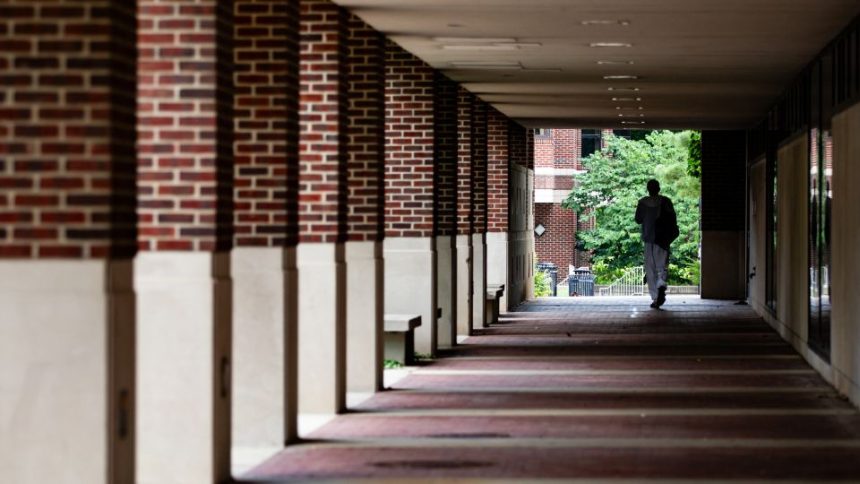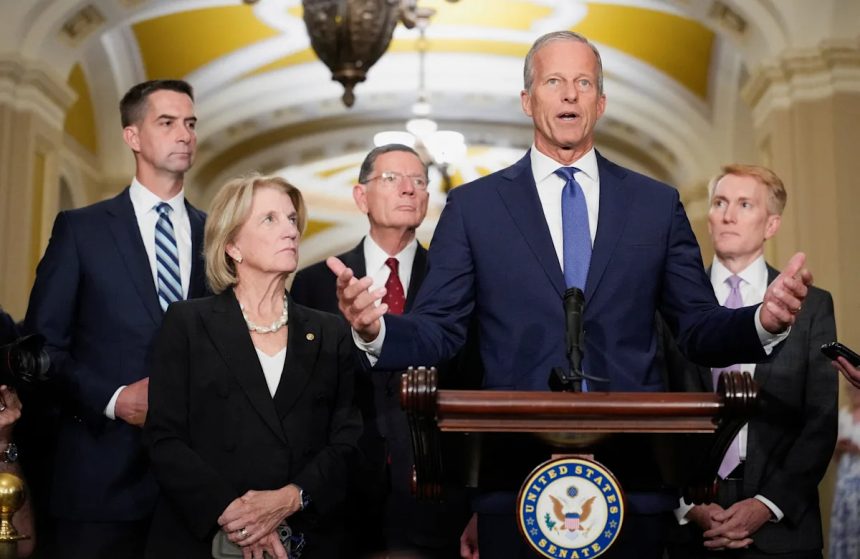College students are heading back to campus under sexual assault rules created during President Donald Trump’s first term – ones that survivor advocates say offer more protections for students accused of sexual assault than those who survive it.
The Trump administration told schools in January that Title IX, the federal law that bans discrimination based on sex and governs how schools respond to complaints of sexual misconduct, will be enforced under 2020 rules after the Biden administration’s version of the rules were only in place for a few months in 2024.
The policy change comes amid the Trump administration’s monthslong campaign to pull funding from universities that refuse to toe the line on a host of issues, from diversity programs to transgender athletes and pro-Palestinian protests.
The revived 2020 guidance narrows the definition of sexual harassment, extending protections for students accused of sexual misconduct and adding requirements like live hearings with the potential for cross-examination.
Now survivor advocates are urging students to understand how these rules impact them as they head back to school and into the so-called red zone that puts students at an increased risk for sexual assault.
About 13% of all college students experience rape or sexual assault, with women ages 18 to 24 particularly at risk, according to RAINN, the nation’s largest advocacy organization against sexual violence. And sexual violence occurs at a higher rate from August to November, when students are making their way through their first semesters in college, RAINN’s data shows.
Title IX’s recent history
Enacted in 1972 to prevent discrimination based on sex in educational settings where federal money is funneled, Title IX allows for the government to terminate federal assistance to institutions that do not comply.
With precious funding on the line, universities have tiptoed through a maze of changing regulations over the years, with many developing specialized offices and staffing coordinators whose sole job is to help them stay compliant.
But Title IX’s approach to sexual assault cases has never been perfect. It’s often bogged down by bureaucracy and policy shifts between administrations, experts say.
In a 2011 “Dear Colleague” letter, the Obama administration implored institutions to take a more proactive approach to combatting sexual harassment, including sexual violence specifically.
“The era of rule by letter is over,” then-Education Secretary Betsy DeVos announced in 2017, saying the Obama policies would be discarded and replaced with new guidance.
A ‘pervasive’ issue arises
Emma Grasso Levine was a student when the 2020 rules came out. She now helps students navigate those rules as a senior manager for Title IX policy and programs at Advocates for Youth, which fights for sexual health and equity for young people.
The new rules create a higher bar for requiring schools to intervene in cases of sexual harassment, stating the behavior must be so “severe, pervasive, and objectively offensive” that it deprives victims of access to their education.
“For instance, because the word ‘pervasive’ is in there, oftentimes that’s interpreted as having to have happened multiple times,” Levine said. “And so a student could report something that happened once, but that was pretty severe, but because it hadn’t happened multiple times, to meet that pervasive standard, the school is not required to respond to it.”
The 2020 policy also does not cover instances of sexual harassment or assault that occur outside official school settings, like off-campus apartments or study abroad trips, Levine said.
Some, like the free speech advocacy group Foundation for Individual Rights and Expression, support the 2020 regulations and the strengthened protections they bring to accused students.
The live hearings with cross-examination are essential to maintain due process amid sexual assault allegations, where so much is at stake, said Tyler Coward, FIRE’s lead counsel for government affairs.
“If a student is branded by their university to be essentially a sex criminal, and that’s on their record, and they face expulsion, good luck getting into any other college anytime in your lifetime,” Coward said.
“If we’re tasking universities to make these sometimes very difficult factual determinations, we should be doing everything we can to make sure that they’re actually getting these things right,” he noted.
While some lauded the rules as protecting the rights of accused students, sexual assault survivor advocates immediately expressed concern back in 2020, and it wasn’t long until the real-world impacts of the rules were revealed.
A ‘grueling’ process
Rachel Newman was a freshman at New College of Florida in October 2022 when she says she was raped in her dorm room, setting off her own experience with Title IX under 2020 rules, she told CNN.
“It happened when I was asleep, so I woke up to the rape, and I basically kind of ran through that night what I was going to do in the morning and who I was going to reach out to,” she said.
In the morning, she reached out to close family and friends and decided to get a rape kit.
Newman reached out to campus police, who engaged the school’s Title IX office, and she started a complaint, she said. Despite a helpful Title IX coordinator, Newman said, it was the start to a “grueling” endeavor.
“I was just completely impacted. I did not leave my dorm room for weeks on end. I did not go to class,” Newman said, for fear of running into her alleged attacker on campus – which she did. Her academic performance and mental health suffered, she said, and she developed a severe eating disorder.
Students involved in Title IX complaints are allowed to have an adviser of their choice to assist them through the process – be it a friend, parent, coach, lawyer or someone else. When the other student got a lawyer, Newman said she felt the pressure rising.
“I personally felt I would have been unprepared if I didn’t get my own attorney, and I felt a lot of pressure to get an attorney. Luckily, I was able to find a resource that provided me an attorney pro bono, but so many people do not have that opportunity as a complainant,” she said.
Because the other student unenrolled at the university, the school dismissed Newman’s complaint, which it has the right to do under Title IX rules. Newman attempted to appeal the decision to no avail, she said.
“I felt like that was kind of like my last chance to kind of have any sort of justice in the situation,” she said.
Newman also pursued a criminal case, she told CNN, but the state attorney decided not to pursue charges after the Title IX case was closed.
Because criminal charges were not filed and the Title IX case was dismissed, there is no record of the alleged rape beyond Newman’s initial complaint with the university, she said.
New College of Florida confirmed a student with Newman’s name was registered from 2022 to 2023, but declined to provide additional details, citing the sensitive nature of the matter. A spokesperson with the university directed CNN to its current Title IX policy.
The Twelfth Judicial Circuit Office of the State Attorney of Florida did not respond to CNN’s requests for comment.
The whole process lasted about six months, most of Newman’s freshman year. Dealing with the current Title IX process stoked a desire to make it more manageable for other survivors.
“In a lot of ways, it mimics the legal system and that can be a deterrent,” she said. “It feels very intimidating.”
In the nearly three years since her alleged assault, Newman sought treatment for their eating disorder and transferred to another university, where she is studying psychology and pre-law. She joined the group Know Your IX, led by Advocates for Youth, where she educates students about the regulations and push for policy changes. After graduating, she hopes to work in Title IX law.
“It leaves its mark, of course, but I look at all the work I’ve had the opportunity to do, and I know that it wouldn’t have been possible if it weren’t for what happened,” Newman said.
Concerns about live cross-examination
Advocates for Youth created a 2021 report on the impact of the Title IX process on students, citing victim blaming, procedural issues and complaints that take more than a year to resolve.
The report describes a nine-hour hearing that a student who revealed intimate relationship details described as “utterly humiliating.”
The live hearing process can be traumatic for sexual assault survivors, says Zoey Brewer, policy and grassroots coordinator with RAINN.
“From the students I’ve spoken with in the past, the live cross-examination is one of the biggest things that deter students from engaging in the Title Nine process,” she said. “It’s something that can be so retraumatizing if it’s not handled in a really delicate and trauma informed way that it can entirely dissuade from some somebody from pursuing a formal investigation as an option at all.”
Levine and other college students around the country spent years advocating for a change to the policy, which eventually came when the Biden administration released a new policy in November 2024.
The new rules expanded the definition of sexual harassment and eliminated the requirement for live hearings. They also included off-campus and international incidents and provided added protections for LGBTQ+ and pregnant students.
“Those pieces of the rule really came from the demands of student activists, youth survivors and Title IX advocates,” Levine said. “Many of us thought – or hoped – that we may have just won a huge victory for student civil rights under the Biden rule.”
That victory was short lived. The 2024 policy faced legal challenges in multiple states, and this January a federal judge issued a ruling that blocked the policy nationwide. Soon after, the Trump administration issued its own “Dear Colleague” letter, advising schools they must return to the 2020 policy created under DeVos.
Live hearings seen as ‘barrier’
The initial introduction of the 2020 policy sent ripples through the world of education, said Kayleigh Baker, a senior consultant who sits on the board of the Association of Title IX Administrators. The group helps support and train the coordinators who often staff these specialized roles.
“The 2020 regulations moved it from something that was administrative to something that often feels like a courtroom,” Baker said, who served as a Title IX coordinator under these policies.
The 2020 policy was implemented on campuses during the Covid-19 pandemic. Some of the live hearings for sexual assault complaints were virtual, but they still required live participation, Baker said.
The advisers students choose are tasked with assisting them through the hearing and cross examination. Some have raised concern this could disadvantage students who can’t afford a lawyer for the process.
Cross-examination under Title IX “isn’t what you see on TV. It’s a more moderated process,” she said. Coordinators are tasked with making sure the questioning is relevant and respectful, Baker said.
“This is not that scene in ‘Legally Blonde’,” Baker tells hearing participants, referring to the 2021 movie starring Reese Witherspoon. “If you as an adviser hope that this is your moment, you have come to the wrong place, because I’m not going to let that happen.”
Still, the prospect of a live hearing can be so daunting for students that some decide to forgo it altogether, she noted.
“I have talked with coordinators who say, ‘We have just as many reports (of sexual assault or harassment) but we have fewer complainants who are willing to go through the formal process,’” she said.
“I think the idea of this live hearing with adviser-led cross-examination is a barrier,” she added. “Even if the idea of it doesn’t necessarily match reality, right? There’s a perception problem.”
Baker emphasized resources are still available under Title IX for students who do not want to go through the formal complaint process. That could mean schedule changes, no-contact orders or academic flexibility, she said.
The brief introduction of the 2024 Title IX regulations sent some schools scrambling to make changes to adhere to the new regulations, which they now have to walk back, Baker said.
“It’s a tough pivot. They put a lot of work into changing their policies, and are having to go back to policies that, you know, they created four years ago,” she said.
The back-and-forth has been difficult for schools, some of which have had a hard time keeping Title IX coordinator positions filled, she said.
These coordinators now need to understand multiple versions of the law, experts note.
What happens next
The Department of Education hosts regional sites under the Office for Civil Rights which provide some oversight for the process and can handle claims from students who feel their schools are mishandling sexual assault complaints. However, experts say many of those local offices have shuttered this year under the Trump administration’s cuts to the Education Department.
With the 2020 regulations likely in place for the foreseeable future, student and survivor advocates say schools and states can implement their own policies, alongside Title IX requirements, to improve the process.
“There’s no rule that says that schools and states both can’t go above and beyond what the real bare minimum of Title IX is right now,” Levine, with Advocates for Youth, said.
That’s where the group’s network of student advocates, like Newman in Florida, comes in. They are working to encourage schools to strengthen protections for sexual assault survivors, like extending school policy to include off-campus incidents.
Newman believes the Title IX process should continue even if a student unenrolls in a school. She would also like survivors to have greater access to legal support.
“I think that no complainant should have to pay for counsel,” she said. “They didn’t choose for any act of violence to occur against them, so they should not have to pay for an attorney.”
Advocates are also pushing for state-level protections, which can provide some recourse for students who choose to forgo Title IX and pursue outside legal action, Levine said.
Across the nation, survivor advocates have been pushing to close intoxication loopholes in state laws that can prevent sexual assault survivors from getting justice if they were unable to consent after becoming voluntarily intoxicated.
The National Women’s Law Center, which fights for gender justice, is involved in ongoing legal action to challenge the Trump administration’s rules.
The back-and-forth on Title IX doesn’t exist in a vacuum, Shiwali Patel, a senior director with the center, told CNN.
“This backlash that we saw was very much in tandem with backlash we were seeing around the #MeToo movement, this general outcry against survivors rights, allegations being treated seriously,” she said. “The backlash also emerged in the Title IX context.”
Advocates are drawing on practices that have proven to work for sexual assault survivors in other settings.
“There are ways to ensure due process is protected while still acknowledging the experience of sexual assault survivors, like using indirect questioning,” Patel said.
“When they claimed due process protections,” she said, “it was actually used as a dog whistle to require weakened protections against sexual harassment.”
If you or someone you know has experienced sexual assault, you are not alone. Visit RAINN’s National Sexual Assault Hotline for help. Call 800.656.HOPE (4673), chat at hotline.RAINN.org or text “HOPE” to 64673.
For more CNN news and newsletters create an account at CNN.com













